The real core of our lives is simplicity.
There is almost zero chance that anyone who reads this blog got to experience what I did. I don’t know many other things in life I can say that about.
If a batch of still-warm chocolate chip cookies became sentient and knew how they were welcomed by everyone throughout the house, and if in this fairy tale the cookies would never be eaten, then that’s the only analogy I could come up with as I bunked down in my RV, parked in the dark on a flat patch of grass in the center of the Hutterville Hutterite Colony southeast of Aberdeen, South Dakota.
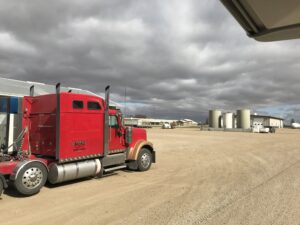 That afternoon, based on an email to someone I have met once, who sent an email to someone I have never met, who sent a text to someone I met two weeks ago, who sent a text to a teacher at the Colony, I pulled into the long gravel drive adjacent to large barns which, by the smell, contained a lot of hogs. A minute later, Eddie Waldner rode up on an old bicycle, dressed in black pants and suspenders and a matching black vest, introduced himself and asked me to follow him. As I parked, he shook my hand, smiled, and said that had it not been for the text introduction, he would have “assumed a California number was a robocall and never returned it”. I guessed we might go to the school for a short interview at the end of his busy day.
That afternoon, based on an email to someone I have met once, who sent an email to someone I have never met, who sent a text to someone I met two weeks ago, who sent a text to a teacher at the Colony, I pulled into the long gravel drive adjacent to large barns which, by the smell, contained a lot of hogs. A minute later, Eddie Waldner rode up on an old bicycle, dressed in black pants and suspenders and a matching black vest, introduced himself and asked me to follow him. As I parked, he shook my hand, smiled, and said that had it not been for the text introduction, he would have “assumed a California number was a robocall and never returned it”. I guessed we might go to the school for a short interview at the end of his busy day.
Trying to summarize a religious minority would be as rude as trying to put all Native people or farmers or any other group into a single box. Look up Hutterites. But if you really are lazy, I guess it would not be COMPLETELY out of line to say that they are a bit like the better-known Amish, except they use whatever modern tools they like. Over the last 150 years they have become a successful force within the farming and economic ecosystems of western Canada and the Dakotas.
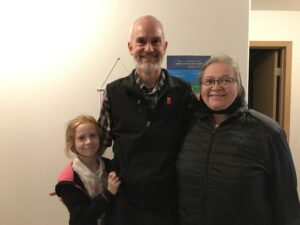 Without asking, Eddie led me into his house, and into the kitchen where his wife, Eileen was putting warm pumpkin cinnamon rolls on the table. Several children wandered in and sat down as if I were a well-known uncle. By the end of our multi-generational chat, they had insisted I stay for church, share in the Colony’s communal dinner, continue our conversation after eating, and spend the night. I have learned on this trip to never say no, even though just an hour earlier I had been under the clearly mistaken impression that Hutterites were about as welcoming of complete strangers as poison oak to a hiker.
Without asking, Eddie led me into his house, and into the kitchen where his wife, Eileen was putting warm pumpkin cinnamon rolls on the table. Several children wandered in and sat down as if I were a well-known uncle. By the end of our multi-generational chat, they had insisted I stay for church, share in the Colony’s communal dinner, continue our conversation after eating, and spend the night. I have learned on this trip to never say no, even though just an hour earlier I had been under the clearly mistaken impression that Hutterites were about as welcoming of complete strangers as poison oak to a hiker.
Over the next 22 hours, I hope and believe I made new friends. I spent the morning with several classes in the school, which is the biggest and most well outfitted school building for 26 students I have ever seen. They insisted I take a loaf of home made sourdough, a jug of grape and aronia berry juice, and even bigger jug of tomato juice. I am confident that if I had asked, they would have filled my pantry with sample jars of, literally, the fruits of their labor, even though I had nothing to offer in return other than a promise of a box of avocados from our yard in the winter.
The Waldner family:
“The real core of our lives is simplicity. We share all of the work in the colony and we have a daily routine. We eat breakfast together and then the children go to school and the adults all have jobs. We get together in the middle of the day for our main meal, and the children go back to school and after that they have jobs they go to. The younger ones are really just going to watch and learn. The children rotate jobs so they get to learn all aspects of what it takes to live here. We have a short church before supper. When we were persecuted hundreds of years ago, it was said that the bounty hunters could find us because we pray both before and after eating.”
“You do your job until it is done. We don’t work a shift and get off work at some time. You are finished when you are finished. We value someone who does a bit that is not asked for. Like if someone asks me to do laundry because they are sick or taking care of babies or something, I will also try to fold it and bring it back to them, even though they didn’t ask me to.”
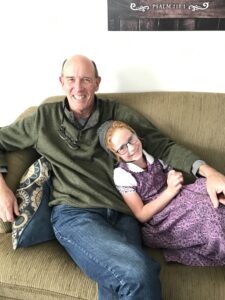 “We get together with families and the children have friends at other colonies. They go visit all the time. Especially after the harvest is in we all have a lot more time. It’s not like we are working all the time.”
“We get together with families and the children have friends at other colonies. They go visit all the time. Especially after the harvest is in we all have a lot more time. It’s not like we are working all the time.”
“Not all colonies are the same. We have a high school and all the children go through grade 12. At some colonies most of the children only go through grade 8. In Canada it seems like more of the colonies want their children to have the higher levels of education.”
“This colony farms about 9000 acres and has a hog barn where we raise pigs up to a certain size and then ship them to other operations. We have about 9000 sows. And we make and sell window blinds. Other colonies have other businesses or specialize in other things. Sometimes we try something that fails so we try something else.”
“Hutterites have been successful because we share and help each other. Think about it. We have equipment or cars that are being shared by 90 or more people; the farmer down the road has the same equipment but it is only being used for one family. We are pretty self sufficient. We do our own building and of course raise most of our own food. We maintain all of our equipment. We dress modestly. But we still buy things in town that we don’t produce or grow here.”
“People who live in the outside world just get so busy. Maybe they have to work more than one job just to get by. They are in traffic and all those people. We get to spend so much time with our children that other families in the outside world just can’t. We would rather be able to do that than to have more material things like fancy cars or expensive clothes.”
“No one gets paid a wage. All of the regular things we need for the house, or clothing, or shoes and all of that, the colony buys and we take what we need. The women sew our own dresses. We get a little spending money, but if we need something that is not a regular item we ask the finance office for that and they put it on a list and get it for us.”
“We never have to worry about not having enough to eat. We all look after each other’s children like they were our own. And when people get older, they never go to a nursing home. We take care of them here; if we have to we hire in specialists like a nurse, but we take care of them here.”
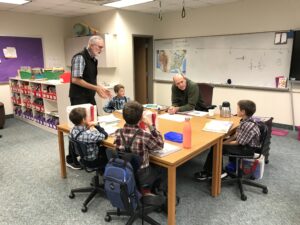 “School is a mix of in-person and online learning. We have all the technology that any school needs for our students to learn all of the regular classes and meet all of the standards. As the students get older they get phones with voice and text, but they don’t get data until they graduate high school.”
“School is a mix of in-person and online learning. We have all the technology that any school needs for our students to learn all of the regular classes and meet all of the standards. As the students get older they get phones with voice and text, but they don’t get data until they graduate high school.”
“It’s not like everyone agrees on everything. We have our disagreements like any group of people. We try to find a balance between making sure the colony is financially successful and making sure we don’t make money a priority. We don’t live this way to acquire material wealth.”


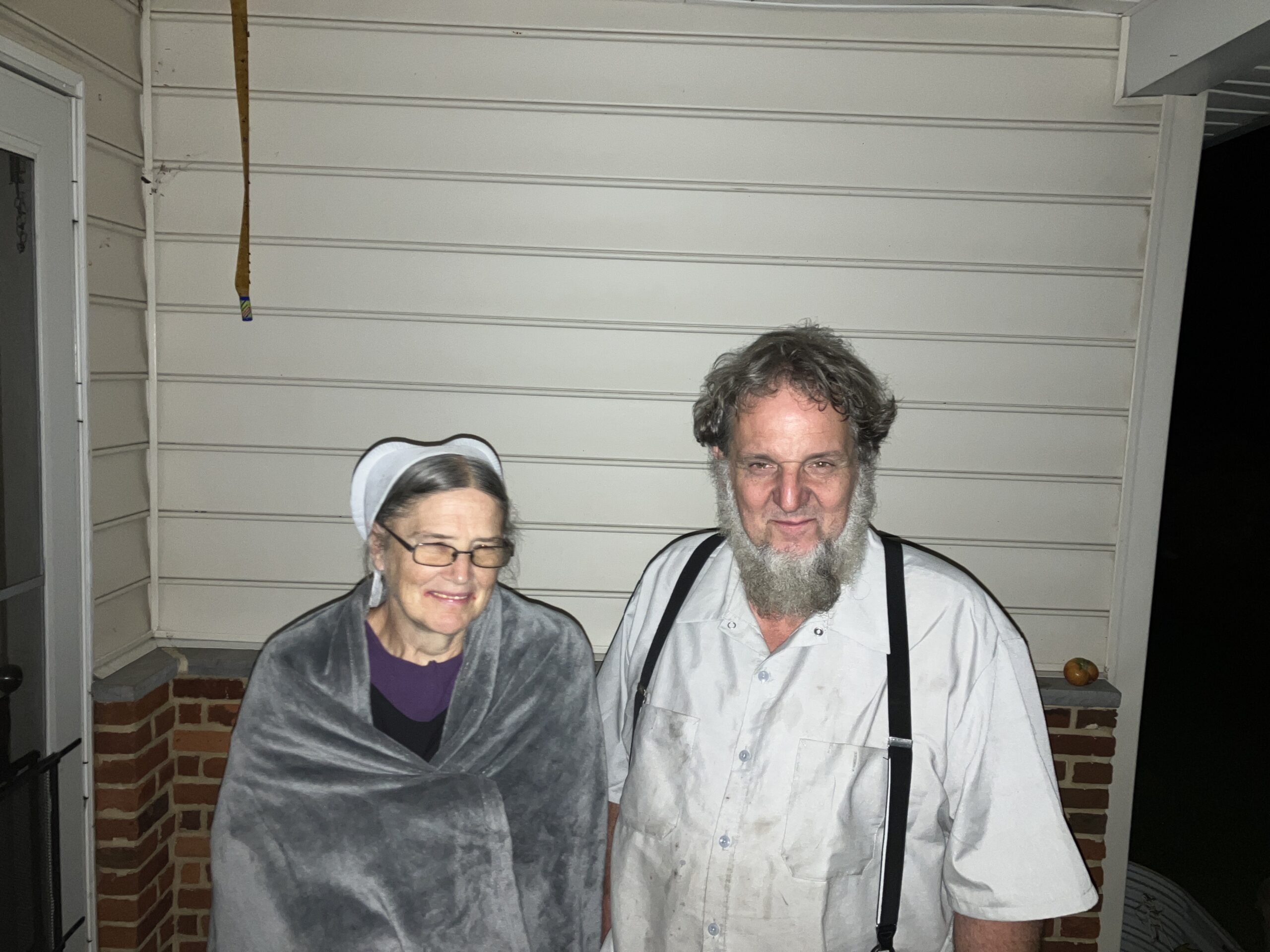









Leave A Comment